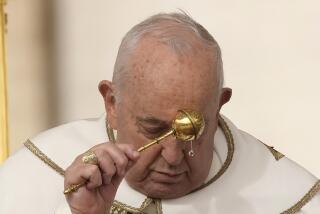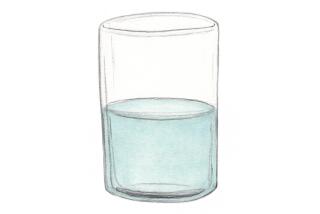A Sense of Duty Gets U.S. Troops Through Easter
BAGRAM AIR BASE, Afghanistan — It wasn’t much of an Easter, standing guard at the outer entrance of this burgeoning international military installation north of Kabul, but there was a beautiful sunrise over the snow-capped peaks and a spring blossoming of apple trees along the hard-packed road about 6:30 a.m. Sunday.
While some of his peers were at a sunrise service, Pfc. Jason Cheely of Atlanta, a military policeman in the U.S. Army’s 10th Mountain Division, was hard at work, trying out his pidgin Dari on the local Afghans whom he questioned and frisked before letting them through his gate.
“It’s not like being home with your family. You can’t hide eggs in a land-mine field,” said Cheely, based at Fort Drum in upstate New York.
He’d already missed Christmas and New Year’s. “I’ve missed just about a year’s worth of holidays. I guess it’s for a good reason. So they understand.”
For most of the men and women of the U.S. military, and for their international partners from Britain, Poland, Spain and a variety of other countries here keeping up the fight against remnants of the Taliban and Al Qaeda in Afghanistan, the day was much like any other.
But for the more active Christians among the troops, there was an added meaning to the day.
The khaki church tent--the only one in Bagram’s “tent city” here with a vestibule--was standing room only when a Polish army chaplain, Father Augustyn Rosly, a Roman Catholic, and a U.S. Army chaplain, Father Bob McMeekin, a Russian Orthodox cleric from St. Croix Falls, Wis., teamed up for a bilingual Easter Mass.
McMeekin, who read an English translation of Rosly’s Polish sermon and also led the singing, said the ecumenical exercise was the largest worship service he’d had since arriving on this dusty plate of land laid out under the eaves of the majestic Hindu Kush. “Now that you all know where the chapel is, I expect to see you back here next Sunday,” he chided the men.
Lt. Col. Bob Cendrowski of Mount Holly, N.J., whose work on safety issues has not left him a lot of free time on Sundays to worship, said he got a lot out of it. “I feel it is a time to reflect and to take time and think about the peace of Easter, the peace of Christ, and hope for this war-torn land, and to realize we can make a difference here.”
For the 87 Polish soldiers at Bagram--mostly engineers and logisticians--Easter (which is Wielkanoc or “Great Night” in their language) included a breakfast banquet with tablecloths and napkins and a centerpiece made out of a particular type of salty mountain cheese shaped in the form of a pascal lamb.
The fare was hard-boiled eggs, sausages, pickles and bread from home, and a cabbage and sausage hunter’s stew called bigos.
U.S. GIs and Marines had nothing out of the ordinary: breakfast of tepid eggs and grits and cold cereal served out from the mess tents on rough picnic tables.
Lunch was the standard MRE--Meals Ready to Eat--in such enticing varieties as beef stew and spaghetti and meatballs.
For the night’s hot meal, though, the cooks were promising the men and women cordon bleu.
The graffiti in the portable toilets gave an insight into what some of the American fighters are thinking, reflections rougher and more obscene than the for-public-consumption comments that they make to the reporters who are permitted to roam more or less freely in the compound.
Spc. Peter Tubiolo, 28, of Monterey, Calif., a former Marine who has moved over to the Army, said inside a massive Soviet-built hangar on the base that it was a very fine Easter.
As he pried his prepackaged lunch--Jamaican-style pork chops--out of its thick plastic shell, he said he had a roof over his head and food to eat and he did not need to ask for much more than that.
His companion, Pfc. Travis Bell of Shelby, N.C., 28, was satisfied too. Of course it was lonely to be away from America on the holidays. But echoing Cheely at the gate, he said, “You know you’re here for a reason.”
More to Read
Sign up for Essential California
The most important California stories and recommendations in your inbox every morning.
You may occasionally receive promotional content from the Los Angeles Times.










